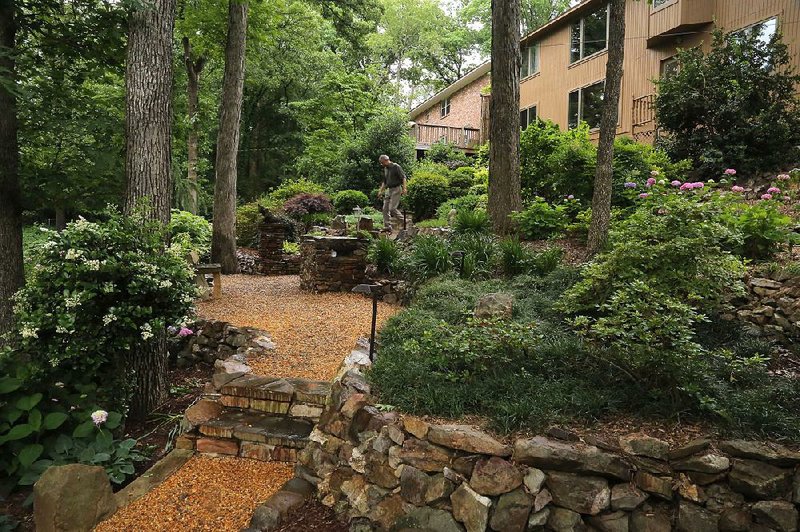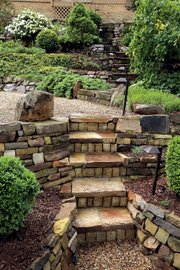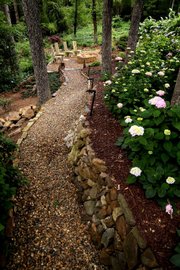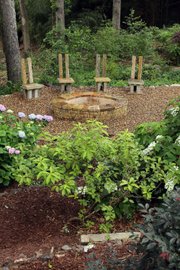Allen Klak's garden makes people wonder. How did he and his wife, Iwona, find such a green nirvana in the middle of Little Rock? -- the backyard sloping down a dozen planted and lighted terraces with curving stone walls, graveled paths, fire pits and waterfalls.
He answers with the shine of a secret in his eyes. They didn't find their two-story house that overlooks the garden. He designed it with upstairs and downstairs picture windows in back.
They didn't just come across the surprise view of foliage and stonework, either. He built the retreat himself, mostly out of rocks that came with the lot.
And to the next question: almost 30 years so far, the time he has invested in this tucked-away Eden of oak trees and azaleas. Invisible from the street, the spot is barely more than a robin's hop away from one of the city's most heavily trafficked intersections.
"I call it the Never Finished Garden," Klak says. The 60-year-old medical technician has plans in mind for projects that will be years in coming, continuing to transform the couple's one-third acre of seclusion.
"I will come and enjoy it," Iwona says, "but he does all the job of it."
He does the garden, she does the cooking.
"Polish," she says, "pierogies [dumplings with filling, as native to Poland as barbecue is to Arkansas]; and wienerschnitzel," a heavy dish as cooking goes, nothing compared to rock work.
"I could not achieve this without her," Allen says, "because I am doing this for us."
"We specialize," she says, and one reason she leaves the stone-lifting to him is that he sees something special where most people would see just another rock. He sees where this particular rock should go, where no other rock would fit as well, and it takes the time it takes.
"You have to learn how to put these stones," he says, "so it's like a puzzle."
The project began as nothing more than the vacant lot they called home as newly arrived refugees from Poland.
"Kicked out of Poland," Klak says. "I didn't want to leave. I thought I was a good guy for my country." But he sided with the Solidarity movement that eventually helped trigger the collapse of Poland's communist regime.
Klak joined in Solidarity's stand for the country's first independent labor union. He wanted a union in the hospital where he worked in the west-central city of Poznan.
A three-month jail term was the consequence of his allegiance with Solidarity founder Lech Walesa, later a Nobel Prize recipient and the elected president of Poland.
After he got out of jail, the police bore down with continual questioning and harassment, Klak says. He worried for his family and his girlfriend, a certain "cute nurse" named Iwona.
"She followed me to Austria," he says, "and we were married in Austria, and we came to the United States together."
It was a different time and place, he says. The causes he supports these days include the Clinton Presidential Center and Wildwood Park for the Arts. And maybe the garden shows what he learned about dangerous politics: when to call enough -- when to find a quiet place, to go to shelter.
The legal and political complexities of their situation worked out with a chance to move to Little Rock, Arkansas, a locale they could not find on the map.
Arrived, they bought the only lot for sale in the neighborhood they chose for being close to hospital work. It was narrow, weedy, rocky, hard to build on, and it looked good to them.
ROCK AND A HARD PLACE
Poznan is about 600,000 population, close to the size of Little Rock's metropolitan area, midway between the larger cities of Warsaw and Berlin. Klak remembers the strictly urban surroundings of his life in Poland, with hardly a tree in sight, no plants in his apartment.
He knew so little about garden landscaping, as he tells it, he never supposed there might be a book that would explain how to tackle his first project, a knee-high retaining wall near the back of their Little Rock house.
"I've learned on my own," he says, "from my own mistakes."
He set about the retaining wall with materials at hand -- rocks, lots of rocks, all sizes, free for the digging. His grander idea at the time was a backyard swimming pool, but it never happened. The high oaks promised to clog the pool, and he saw himself endlessly scooping leaves.
"I thought that would be it," Klak says. "But my wife said, 'Well, we could have a grill.'"
Gathering more rocks to make the grill, he began to shape one of the guiding principles of his work in the garden: everything made to last. Wood goes soft, rocks don't. Store-bought falls apart, rocks don't.
Water pumps wear out, but not the underground pipes that Klak designed to spill rainwater down natural-looking stone channels. His man-made waterfalls prevent erosion while doubling as irrigation. He traces the system as if he could see through the soil cover, which, in a way, he can. He keeps it all in mind.
"I don't draw anything," he says. "I have to see it in my head."
He rates himself an amateur garden-designer partly for lack of diagrams, swearing he could not guide anybody else to make a layout the same as this one.
Besides, rocks are rocks are rocks, sometimes big rocks, and it might seem a mystery -- a la Stonehenge -- how he got all this done.
"I'm not a big guy," Klak acknowledges; he weighs 163 pounds, half the weight of one of the stone chairs he made around the most mystical of the fire pits.
The pit is an eye-shaped stone container, and the high backs of the four chairs represent eyelashes -- all in all, a sight to behold from the big upstairs window: It's an eye that looks back. The chairs also signify family, one each for him, his wife and their grown daughter, Olivia. The fourth chair is slightly lower, ready to welcome a future son-in-law with a bit of a prank.
In summer, Klak outfits the fire pit with a plastic liner so it holds water and floating candles, whimsical except for the sheer weight of it.
He talks about "pieces of wood" for leverage, and a wheelbarrow, the occasional hired hand for "extra muscle," but none of this amounts to instructions on how to move a boulder.
His wife keeps a worried eye on him, she says, and so do the neighbors.
"I ask them," she says.
Lately, he is under doctor's orders to go easy on his tired back. The doctor's warning led to Klak's construction of a steel-cable zip line to transport heavy loads down the slope.
Before, "everything was in my hands," he says, "and on my back." And sometimes, he forgot he wasn't just carrying a tune.
"It's very addictive," this garden-building," he says. "It's constant gratification."
STONE CERTAIN
Among the Klaks' friends who have visited the garden is their nearby neighbor, Little Rock City Director Kathy Webb.
"A wonderland," she describes it.
"Allen made the walkways, and cut the stones for the steps. He designed every detail," she says. "The lighting is spectacular at night, and it truly is an oasis in the city."
But Klak says he doesn't so much enjoy looking at his accomplishments as he does planning what's next. He still has an empty swath of land at the bottom of the property, and anything at all might go there.
Besides, it looks to him like some of the steps could be wider. And if he can just keep certain of the smaller plantings happy, one day they will hide the fence. With compost and wood mulch lavished on them, after all, why wouldn't these shrubs agree to grow? Maybe it's just a breeze, but they seem to be nodding.
Thirty years and half a world away from the forces that made him flee his home country, he is home in Arkansas. "We're never leaving this place," he says.
HomeStyle on 05/28/2016




